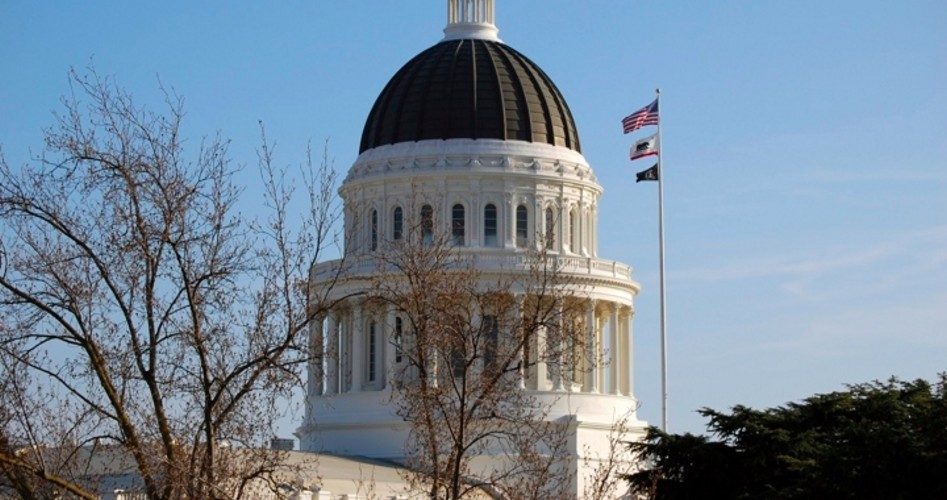
The California State Senate on September 3 unanimously approved a bill to severely limit the federal government’s unconstitutional power to indefinitely detain citizens of the Golden State under provisions of the National Defense Authorization Act (NDAA).
By a vote of 37-0, state senators expressed bipartisan support of the Bill of Rights and habeas corpus. The measure’s successful passage by both houses of the state legislature (the state assembly passed the bill by a vote of 71-1) is a victory for civil liberties and a remarkable demonstration of the ability of lawmakers from opposite ends of the political spectrum to work together.
The act — the California Liberty Preservation Act (AB 351) — will now go to Governor Jerry Brown for his signature or veto.
Originally sponsored by State Assemblyman Tim Donnelly, a conservative Republican (now running for governor), the bill’s senate sponsor was one of that body’s “most liberal lawmakers,” Mark Leno.
“Indefinite detention, by its very definition, means that we are abrogating, suspending, just throwing away the basic foundations of our Constitution and of our nation,” Leno said.
After being warned by some of his fellow Democrats that siding with Donnelly was tantamount to political suicide, Leno stood firm in defense of liberty.
“It doesn’t matter where one finds oneself on the political spectrum,” he said. “These two sections of this national defense act are wrong, unconstitutional and never should have been included.”
Grassroots support for the act comes from a broad, politically diverse coalition, as well.
AB 351 is backed by the Taxpayers for Improving Public Safety, the Bill of Rights Defense Committee, the Tenth Amendment Center, the California American Civil Liberties Union, San Francisco Board of Supervisors president David Chiu, the Libertarian Party of California, and the Siskiyou County Board of Supervisors.
Specifically, if enacted, the bill would shield from federal assault several fundamental constitutionally guaranteed civil liberties, “including the right of habeas corpus, the right to due process, the right to a speedy and public trial, and the right to be informed of criminal charges brought against him or her.”
Relying on the 10th Amendment’s reservation to the states and the people all powers not specifically delegated to the federal government in the Constitution, the bill is a constitutionally sound expression of state sovereignty.
In a press release issued by his office after the committee approved his bill, Assemblyman Donnelly recognizes his duty to resist attempts by Washington, D.C., to deny Americans of their most basic freedoms.
“The NDAA gives the executive branch — under not only President Obama, but also every future president — unprecedented power to detain US citizens without due process. This runs counter to the very principles that make America great, and violates our nation’s commitment to the rule of law,” said Donnelly.
He continued,
We have a moral duty to protect Californians from the disastrous consequences made possible by NDAA. When Constitutional protections are ignored, racist hysteria allows vulnerable groups to be targeted. It was not long ago we memorialized the tragedy of Japanese American internment camps on the floor of the California State Assembly. I am grateful for today’s committee vote, which shows Californians that their representatives are serious about ensuring similar violations of freedom and human rights abuses never happen again within our State.
While the text of the bill lays out specific ways in which the NDAA denies citizens many of the most basic constitutionally protected civil liberties, the surprising scope of the NDAA is still unfamiliar to most Americans.
President Barack Obama signed the latest National Defense Authorization Act (NDAA) into law on January 2, renewing the power to apprehend and detain Americans indefinitely granted in the previous year’s version.
The Fiscal Year 2014 version of the bill is currently working its way through Congress. At this time, many amendments that would have stricken some of the most pernicious provisions from the act have been defeated.
As for the most unconstitutional parts of the NDAA 2012 that remain in effect, a bit of history is in order. On December 31, 2011, with the president’s signing of that law, the writ of habeas corpus — a civil right so fundamental to Anglo-American common law history that it predates the Magna Carta — is voidable upon the command of the president of the United States. The Sixth Amendment right to counsel is also revocable at his will.
Furthermore, a key component of the NDAA mandates a frightening grant of immense and unconstitutional power to the executive branch. Under the provisions of Section 1021, the president is afforded the absolute power to arrest and detain citizens of the United States without their being informed of any criminal charges, without a trial on the merits of those charges, and without a scintilla of the due process safeguards protected by the Constitution of the United States.
On the face of the bill, it would seem that California’s state lawmakers are determined to protect their citizens from being seized and imprisoned under the provisions of the NDAA.
While AB 351, as well as Section 1029 of the current version of the NDAA purport to buttress the right to a trial for citizens and permanent residents, it does nothing to prevent their apprehension. Denial of habeas corpus (or a trial) comes later; it is the delirium, not the fever, in a manner of speaking.
Put simply, Californians would not need to worry about being held without charge if the president was not authorized in the same act to deploy the armed forces to round up the “suspects” and detain them indefinitely. Being apprised of the laws one is accused of having violated is important, but it’s the detention and the manner of it that must be of more immediate concern to those who are alarmed about the new world order being defined by the NDAA.
While the bill is not perfect, it is a significant step toward stopping the frightening federal attempt to legislatively repeal the Constitution. In a statement to The New American, the Tenth Amendment Center’s Michael Boldin praises the California state legislature for its courageous, bipartisan action.
California would be the second U.S. state to challenge this particular law, after Virginia last year. But the impact of such resistance by the massive Blue State could lead to a wave of resistance in others states, as happened after California voters first passed a law to nullify federal marijuana prohibition in 1996. Civil libertarians view indefinite detention, otherwise known as internment, of Japanese Americans during World War II as a dark stain on American history.
And:
In passing bill AB 351, the California State Legislature took precisely the step that James Madison advocated states should take when the federal government oversteps its bounds — a “refusal to cooperate with officers of the Union. “ I commend the California Legislature for their broad bipartisan support of this bill, but the effort is far from over. Governor Brown must still sign the bill into law. If he does, other states will certainly follow California’s lead and prove once again, like Rosa Parks did, that saying “No” can change the world.
A call to Governor Brown’s office was not returned by press time.
Joe A. Wolverton, II, J.D. is a correspondent for The New American and travels frequently nationwide speaking on topics of nullification, the NDAA, and the surveillance state. He can be reached at [email protected]


